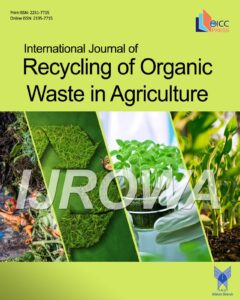Effect of organic fertilizers rate on plant survival and mineral properties of Moringa oleifera under greenhouse conditions
Authors
Abstract
Purpose The nursery is the production of vigorous seedlings for field transplantation. Fertilization improves the quality of Moringa oleifera in the greenhouse. Thus, the effect of composts amendments on the survival rate and mineral composition of M. oleifera was studied.
Method A randomized complete block (RCB) design comprising fourteen treatments and twelve repetitions (pots referring to as repetitions), was led out in greenhouse. Varying compost receipts (0.1 kg, 0.2 kg, and 0.3 kg) were used and an increasing amount of a chemical fertilizer (NPK: 20:10:10) was added in some treatment at 25 days after sowing. Parameters such as germination rate, survival rate, biomass, and mineral composition of M. oleifera plants were assessed.
Results The germination rate was maximal (100%) in the combined treatment PM1 (0.8 kg of soil+0.1 kg). A considerable reduction of germination rate and high plantlet mortality were observed in treatments that received chemical fertilizer, although the mineral components’ uptake in young M. oleifera plants was considerably improved. The highest dry root biomass was obtained from the treatments MF1 (0.8 kg of soil+0.032 kg each of cow dung, goat, chicken manures+0.003 kg NPK) and CM1 (0.8 kg of soil+0.1 kg of cow dung compost), with, respectively, 0.62 g and 0.59 g per plant.
Conclusion All composts types used in this study have appeared as appropriate amendments to improve the M. oleifera production in nursery, through an increase of the vigour and mineral composition of this valuable plant.



